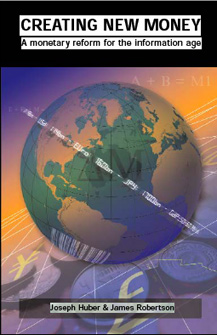Seigniorage Reform: How to make a new monetary system
The monetary system we know has run into serious trouble and it is very unlikely that more of the same policies that got us into the current bind will be sufficient to get us out of it again. Alternatives to the debt based system of bank-created-money have been discussed for decades, but reforms were put off because for certain people at the top of the pyramid, the system is extremely profitable. With the collapse of major banks and the need for taxpayers to step in to save the day, the calls for reform are getting louder and more articulated.
Umair Haque, in a recent article titled "Four Ways to Build a Better Economy" alludes to monetary reform as one of the changes we need to make to overcome the current crisis:
The Currency Fix. "The invisible hand doesn't mean that profiteers get to reach into your pocket with every trade. Yet, that's the economy we've built: one where you bear a collective responsibility for the decisions of bankers, beancounters, and other borrowers. Why? Because you have to invest, consume, and earn in a national currency, which can whipsaw up, down, or sideways, leaving you and your savings at the mercy of the state and the crony capitalists that control it.It's time for this con game to end. Tomorrow's radical innovators will reconceive currency itself: they will design next-generation currencies that are globally accessible, ubiquitously liquid, and that are inherently, permanently hedged and insured -- so instead of getting inflated, deflated, disinflated, and eviscerated, currencies can do what, well, they were meant to do: serve as a durable store of authentic value."
I would add that an even more important function of currency than "durable store of authentic value" is to be an "abundantly available means of exchange and investment". Those two functions, mediating the exchange of goods and permitting investment for productive activities are perhaps the most immediately important functions of any monetary system and they should be programmed into a new currency right from the start.
A report by Joseph Huber and James Robertson of the New Economics Foundation lays out and discusses a direction of currency reform, to bring our monetary system into alignment with today's new realities:
The rules of the money system have shifted. The majority of money that now changes hands does so electronically. As a result, far more than ever before, new money is not issued by the state but by banks. Ninety seven pounds in every one hundred circulating in the economy will now have been issued by banks (in the form of sight deposits, printed into customers' accounts as interest-bearing debts). Only three pounds are cash, issued by the state (in the form of banknotes and coins, issued at no interest). The cost to the state of issuing new money is only the cost of producing banknotes and coins. The cost to the banks of issuing new money is virtually zero. The state receives public revenues from issuing cash, but banks make private profits. The benefits of the money system are therefore being captured by the financial services industry rather than shared democratically.
- - -
This report represents a fundamental breakthrough on this agenda. While the principles of monetary reform have been asserted often enough before, the steps from where we are to where we need to be, in terms of a democratic and efficient money system, have been obscure or unconvincing.For the first time, this report offers a practical and clear step-by-step agenda on the essential first step of restoring the right of issuing new money in a modern economy to be of benefit for the common good. In the terms of the new thinking that is emerging about the creation of sustainable and inclusive economies, this is an achievement that ranks high. It fits directly into a new theoretical model, combining socio- and ecological economics, in which market actors are located within common property resources rather than allowed to free-ride on the back of them.
. . .
Today's monetary and banking system is, in essence, still based on the 500 year old fractional reserve system suited to metal money. It still has to catch up with the new payment practices and the accelerating circulation of non-cash money based on modern information and telecommunication technology.
The reform we discuss in this report is different from those. It is not directly linked to them, but is a wider issue. It is a reform of the mainstream monetary and banking system. It reflects the values of a democratic civil society and the need for economic and financial stability. It is in tune with the Information Age.
The reform that is being proposed by Huber and Robertson is articulated in a very simple two steps:
1. Central banks should create the amount of new non-cash money (as well as cash) they decide is needed to increase the money supply, by crediting it to their governments as public revenue. Governments should then put it into circulation by spending it.
2. It should become infeasible and be made illegal for anyone else to create new money denominated in an official currency.
Commercial banks would thus be excluded from creating new credit as they do now, they would be limited to credit-broking and a financial intermediary role.
"We refer to this as "seigniorage reform". While adapting to the new conditions of the Information Age, it will also restore the prerogative of the state to issue legal tender, and to capture as public revenue the seigniorage income that arises from issuing it. Originally, seigniorage arose from the minting and issuing of coins by monarchs and local rulers. Extending it to the creation of all official money will correct the anomaly that has grown up over the years, resulting today in 95% of new money being issued, not by governments as cash (coins and banknotes), but by commercial banks printing credit entries into the bank accounts of their customers in the form of interest-bearing loans."
So the central principle is that new money should be created as debt-free public revenue and not as debt-constituting banking industry assets. The paper discusses various options for spending that money into the economy. The advantage of this versus earlier similar approaches to monetary reform is that the proposal is no-nonsense and doable, and the discussion leaves room for government decisions while clearly outlining what the important changes are that should be at the basis of a new system.
I recommend you download the paper for study. It brings a lot of clarity into a rather murky area that has been kept so for a long time by economists' unwillingness to look at, and propose to change, the basics of how we create and tune money so it will best serve our individual and collective economic interests.
CREATING NEW MONEY
Joseph Huber & James Robertson
A monetary reform for the information age
Ending the creation of money by the banks will also be surprisingly simple. The monetary and financial institutions will stay the same. Almost all the everyday routines of the banking and financial markets will continue as if nothing had happened. No one's monetary possessions, including the banks', will be touched. Nothing will be expropriated.
- - -
Thanks go to Michel Bauwens of the P2P Foundation for discovering and sharing both the pieces referenced and quoted in this post.






The reform that is being proposed by Huber and Robertson is articulated in a very simple two steps:
1. Central banks should create the amount of new non-cash money (as well as cash) they decide is needed to increase the money supply, by crediting it to their governments as public revenue. Governments should then put it into circulation by spending it.
Insane proposal. The US Federal Reserve is the only entity legally empowered to create and issue money. They print it out of thin air, then lend it to banks and other institutions and businesses at a respectable interest rate, that being the only thing "respectable" about this scam. The US government, in 1913, gave them this power. I believe it was Jefferson who warned against giving the power to issue money to anyone. It should reside with the elected government.
2. It should become infeasible and be made illegal for anyone else to create new money denominated in an official currency.
If this means take away the Feds power to create money, let's do it.
Commercial banks would thus be excluded from creating new credit as they do now, they would be limited to credit-brokering and a financial intermediary role.
The US Federal government does also "print" metal money with the coin system.
It competes directly with the fiat money the Fed generates "out of thin air" and is based on the gold standard.
See this story, "Good as Gold", where the IRS cold not destroy the business of a man in southern Nevada as he paid his employees in gold and silver coins -
www.liberty-watch.com/volume03/issue08/coverstory.php
(link no longer active - Sepp)
"While the currency in the precious-metal system was greater in value than the currency in the other system, as money and a medium of exchange, the law knows no difference between the face value of both currencies.
Take socialist Karl Marx’s theory, for example. He believed the most effective way to obliterate the middle class involved a system of progressive taxation coupled with inflation. In the Federal Reserve’s case, if the bank continues to inflate the currency so that everybody moves into higher and higher tax brackets, eventually everybody will pay 30 to 40 percent of their income to taxes in Federal Reserve Notes, all while the FRN decreases in value due to inflation.
“By using the gold coins, Kahre was beating Karl Marx, the socialists and the liberals who want people to pay more and more so they can have bigger and bigger government,” Hansen said. “Kahre challenged the whole system and that’s why the IRS came down so hard on him and his associates.
“The IRS doesn’t want this going on; they want you to use their fiat money and be forced into higher tax brackets through progressive taxation coupled with inflation. That way there’s no limit on the money they can issue and inflate.”
The government called three accountants to testify. The defense asked each one, “What is the proper way to calculate income for purposes of the Internal Revenue Code if you are paid in a gold coin that has a $50 face value on it?” All three of them responded, “I do not know; I’ll have to research that.”
“One of them had a masters degree in taxation!” Hansen observed, saying their answers made it difficult to prove the defendants willfully committed tax crimes. “If accountants and masters of taxation don’t know the answer to this question, how in the world can they expect anything different from an ordinary person who is confronted with a dual monetary system created by Congress?”
“If a coin says it is a $50 gold piece, and it says ‘In God We Trust,’ and the law says that it is legal tender, and it is in circulation, isn’t it reasonable for people to think that they can calculate their tax liability based on that?” Hansen asks. “If a tax accountant can’t answer that question, how can a common worker be guilty of a crime? The outcome of this case is a magnificent victory for those of us who believe that the United States of America should have an honest monetary system.”
Well done, Sepp, once again! Thank you for bringing your page to my attention!
I used to oscillate between analysing the causes and sympathising with the effects. Now I fear a one world central bank and a single global currency, while I petition responsible representatives of Parliament online. See http://tinyurl.com/666rwd
But we each have to translate our understanding of the system into our own way of 'spreading the word'.
Yours most connectedly,
Sabine
Hello Sepp
the book of James Robertson and Joseph Huber "Creating New Money" is also available for free download on the website of James Robertson (along with other books and articles)
http://www.jamesrobertson.com/book/creatingnewmoney.pdf
Regards
Paul
I notice the word 'corruption' is not mentioned once in the "CreatingNewMoney" article. Rather optimistic, isn't it? I must admit, they mention "non-corrupt administration" as a precondition for other countries to follow suit, but the concern with this most serious prevailing human condition seems to fall short of the magnitude of the problem. Wherever government spending is mentioned, words like 'nepotism', etc. etc. seem to abound! In fact, governmental monopoly is virtually synonymous with corruption.
A system where money has more direct democratic ties and will truly belong to the public is perhaps not too far fetched. But more about that later. Let me first read on!
Thanks
Sebastian
Thank you Paul, for adding a reference to James Robertson's site. For anyone who would just like to look around there, use this link:
http://www.jamesrobertson.com/